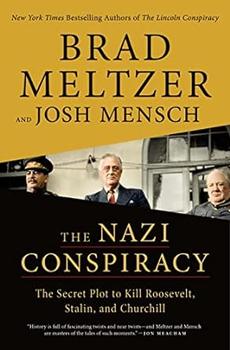Book Club Discussion Questions
In a book club? Subscribe to our Book Club Newsletter!
Please be aware that this discussion guide will contain spoilers!
-
What characteristics do you feel a leader should demonstrate during a time of war? Do you think Roosevelt, Churchill and Stalin displayed those characteristics? Which traits did each possess that hindered their ability to be an effective leader, in your opinion?
-
Do you see similarities between the present political or cultural climate in the United States and those of the years leading up to World War II in Germany? If so, what are they? Can we keep history from repeating itself, and if so, how?
-
The United States and Russia were at one point very close allies, yet a few years later the countries were embroiled in the Cold War. What do you think led to this shift?
-
Toward the end of the book, the author explores the possibility that the plot to assassinate the Big Three was a ruse by Stalin, and says "the answer may come down to whether you choose to believe a former Soviet spy or an ex-Nazi." Do you believe the conspiracy was real? Why or why not?
-
The book opens with Japan's surprise attack on Pearl Harbor. Do you think the level of secrecy required to pull off such a maneuver would be possible today?
-
Several men besides the Big Three were mentioned throughout The Nazi Conspiracy (head of security Mike Reilly, Soviet spy Gevork Vartanian, "The Most Dangerous Man in Europe" Otto Skorzeny, etc.). Did you find yourself wanting to know more about any of these figures? Which, if any, did you end up researching further?
-
The author states that "most Americans simply did not know or care about the threat of Nazism in Europe." The world faces similar threats today. How aware do you think most Americans are of the situation in other countries today, and how much do you think they care?
-
How has war changed since the days of WWII? Under what circumstances do you believe countries would be willing to commit the same resources today as they did during that war?
-
What surprised you about The Nazi Conspiracy? Did you learn anything new about the era?
-
Churchill used the words "storm and ruin" to describe the state of the world at the start of 1943. What word or two would you choose to describe for this time period? Using one or two words, how would you describe the state of today's world?
-
The author talks about the Dolittle Raid, during which a small number of B-25s bombed targets in Japan, landing in China afterwards. Japanese troops killed 200,000 to 250,000 Chinese civilians in retaliation. Had you heard of this raid before? Were you surprised by the repercussions?
-
What did you think of Roosevelt's decision to have Yamamoto assassinated? Do you feel assassination is a reasonable action to take during wartime? Is it valid any other time?
-
Stalin and Roosevelt pushed for a cross-Channel attack, while Churchill wanted to concentrate troops in Italy, attacking the "soft underbelly," as he put it. Why do you feel Churchill was so invested in this strategy? If Churchill had gotten his way, how do you think it would have impacted the war?
-
Roosevelt goes behind Churchill's back in his attempts to have a one-on-one meeting with Stalin. What did you think of this decision? Did you view it as a betrayal of Churchill? When do you believe this type of deception is OK?
-
Why do you feel Stalin was so slow to agree to a meeting with Churchill and Roosevelt? Do you think his insistence on Tehran as a meeting point was reasonable?
-
In discussing post-war Germany, Stalin suggests "liquidating" 50,000 to 100,000 German military officers. Churchill was horrified even though Stalin claimed to be joking. Do you believe he was?
-
Did your opinion of any of the three leaders change as a result of reading this book?
-
Roosevelt attended several conferences with world leaders during the war. In what ways do you think these conferences would be the same if held today, and in what ways would they differ?
Unless otherwise stated, this discussion guide is reprinted with the permission of Flatiron Books.
Any page references refer to a USA edition of the book, usually the trade paperback version, and may vary in other editions.
